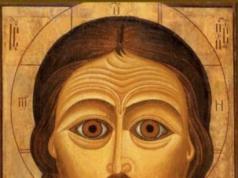What is Devil's Advocate
Devil's Advocate - This an expression commonly used to describe a person who opposes a general idea, not for the sake of real opposition, but for the sake of an effective counter-argument.
What is THE DEVIL'S ADVOCATE - meaning, definition in simple words.
In simple terms, Devil's Advocate is a person who must find all the weakest points in any concept and question them. So to speak, test the entire structure for strength, striking at the weakest points.
Origin of the term: Devil's Advocate.
The emergence of this term was facilitated by the Roman Catholic Church, namely its ritual of canonization of saints. The bottom line is that when the church decided to canonize someone, the position of the so-called “devil's advocate” was present in this ritual. This person had to present to the clergy all the arguments against the canonization of this or that person. Thus, the Church tried to guarantee the fact that the canonization was carried out in good faith and with consideration of all the pros and cons. As a result of this process, if canonization took place, then the candidate was considered truly worthy of the title of saint.
Application of the expression “Devil's Advocate” in everyday and business life.
The interesting thing is that business has adopted the devil's advocate concept from the church. Many large companies use a similar technology to test their ideas for strength before putting them into operation. The thing is that when a team works together on a task, it goes into the so-called state groupthink" In this state, people lose their tendency to notice shortcomings and criticize colleagues, hesitating to damage the overall collective cohesion. It is to solve this problem that a person is brought in who will point out all the weak points.
In everyday life, many people use this term as a preliminary apology for a subsequent controversial and possibly offensive statement. It might sound something like this: “ Now I'll play devil's advocate for a bit. You know that your idea is just crazy... It's ridiculous and stupid because...»
In a company, people who often try on this role can seem like very irritable characters. But they are the ones who can promptly point out existing problems and suggest a way to solve them.
The devil's advocate is the one who sees in a person only his shortcomings, who speaks evil of his neighbor. Sometimes this is said about a citizen who starts an argument for the sake of an argument in order to piss off his opponent, and not together come to a mutual consensus with him.Canonization usually refers to the elevation to sainthood followed by worship. This practice has spread widely since the early Middle Ages. Before exalting the cult of Christian saints, a huge amount of work was done to eliminate and prohibit unwanted sects and cults. Back in the fifth century AD, the Roman bishops placed the work on their fragile shoulders to decide who would be a saint and who would not. This happened due to the rapid “reproduction” of all kinds of suspicious saints. Similar actions were taken by clergy from the Frankish kingdom.
Already from the tenth century, some bishops, in order to increase the cult of saints among the people and contribute to its popularization in society, turned to the Roman throne for the highest approval. It was from this period that canonization appeared, such as we know it now. Since in those days it was not possible to obtain information about a candidate for sainthood, there was an urgent need that, along with the name of the future saint, information about his actions and good deeds should also be provided, and that then this information would be subjected to scrupulous verification from the point of view of classifying this person as a saint. the face of the saints. Thus, preparations for canonization were gradually created, in which disputes in which the so-called “devil's advocate” was an indispensable participant played a huge role.
Culture of speech communication: Ethics. Pragmatics. Psychology
Devil's Advocate
such a participant in a dispute, discussion, discussion who expresses arguments characterizing only the negative aspects of the problem under discussion, looks for facts that reject a positive solution to the problem, without stopping to see that the arguments look clearly ridiculous; in judicial practice - a malicious, meticulous prosecutor, setting out exclusively the negative sides and traits of the defendant. This expression also denotes a picky critic. You shouldn't speak entirely in this spirit (you need to mention something positive as well), otherwise it will convey the idea of bias.
Catholic Encyclopedia
Devil's Advocate
(lat. advocatus diaboli) is the informal title of the office of the institution of canonization of the Catholic Church. Officially, this position was called strengthener of faith ( lat. promoter fidei). It was introduced in 1587 by Pope Sixtus V and officially abolished in 1983 by John Paul II.
The function of the devil's advocate was to collect all possible arguments that could prevent the canonization of a potential saint. Canonization could only take place if the strengthener of faith did not find arguments of sufficient importance to cancel the procedure. Until 1983, no act of canonization could be recognized as legal unless the devil's advocate was present at the act.
In modern parlance, the term is often used to refer to people who defend a position that they do not themselves hold. Sometimes they do this simply to argue, sometimes in order to identify possible logical flaws in their own position or to try to prove their position “by contradiction.”
Without a doubt, this film, which is an example of the brilliant performances of Al Pacino and Keanu Reeves, played a significant role in the spread of this expression. It is thanks to the film that the expression Devil's Advocate gives rise to associations with know how to benefit from everything and then forget it; I know everything, but I can’t do everything; killing with kindness is our secret;As your lawyer, I advise you to stay away from me; .
At the same time, the expressionDevil's Advocate ( The Devil's advocate ) appeared much earlier and initially had a completely different meaning. Thus, in the Catholic Encyclopedia under Devil's Advocate ( lat. advocatus diaboli) is understood as the unofficial title of the office of the institution of canonization of the Catholic Church. The official title of Devil's Advocate is Faith Strengthener ( lat. promoter fidei). It was introduced in 1587 by Pope Sixtus V and officially abolished in 1983 by John Paul II. Linguistically, a more accurate translation from Latin of the expression advocatus diaboli is devil's advocate.
The Devil's Advocate's task was to collect and present all possible arguments that could prevent the canonization of a potential saint. In particular, such arguments include a selfish motive when doing good deeds. For k anonization requires a positive decision based on the results of the dispute between two parties expressing opposing opinions and giving corresponding arguments. The name of the second party is God's lawyer(lat.advocatus Dei). Its task is to present materials and information confirming the positive qualities of a potential saint, allowing us to talk about the possibility of canonizing him. Respectively, a person could not be recognized as a saint if the arguments presented by the Devil's Advocate were sufficiently weighty. The presentation of arguments and evidence by two sides defending opposing opinions superficially resembles an adversarial trial in court. Until 1983, the presence of a Devil's Advocate was a prerequisite for the legality of the act of canonization.
In modern usage, the term Devil's Advocate has many different meanings. It is interesting to note that among them there are both those with negative and positive meanings. Thus, in the book “Organizational Behavior” by D. Newstrom and K. Davis, this term is understood as a member of a group, one of whose responsibilities is to constructively criticize the proposals of colleagues, analyze their arguments and logic, which allows them to make informed decisions. The English-Russian dictionary defines Devil's Advocate as a person who defends a wrong cause or position. Quite often there is an interpretation that means a person defending a position that he himself does not adhere to. In this case, the motive for behavior can be either simply a desire to argue, or a desire to identify possible logical flaws in one’s own position or to try to prove one’s position “by contradiction.” Also quite often, the expression Devil's Advocate is used in relation to a person who looks for only dark, bad sides in something or someone, who is only interested in this side of the matter. After the release of the film of the same name, the expression began to be used in relation to a lawyer defending an outright criminal who has committed a particularly serious crime and, both from a moral and legal perspective, deserves the most severe punishment.
The expression Devil's Advocate is stable and has meanings comparable to Russian ones in other languages. Yes, yeahThe 1992 American Heritage Dictionary of Idioms by Christine Ammer reveals the meaning of the expression Devil's Advocate ( d evil's advocate) as a term of the Roman Catholic Church, which denotes a specially appointed person whose task was to put forward arguments against the canonization or sainthood of the represented persons. The expression has been used in English in a broader sense since the mid-18th century.
At the same time, if you think about who the Devil's Advocate really is, the picture turns out to be somewhat more complex. We must agree that the progenitor of evil himself has little need of anyone’s protection. Especially on earth. Rather, one can speak of the need for protection for the other side. Another thing is that after defense, the second function of a lawyer is to represent the interests of his client. Based on this construction, we can conclude that the Devil's Advocate carries out activities on earth on behalf and on behalf of his represented, the result of which may be the transfer of ownership of the soul of the counterparty in a transaction concluded by the lawyer on behalf of the represented. With this design, the Devil's Advocate becomes a lawyer for extraordinary transactions, specializing in. However, this conclusion is not entirely correct.
Despite the seemingly absurd position implying the specialization of the Devil's Advocate on such things, this position has its reasonable justification. Quite often, when we think about our intention to commit a particular act, we are faced with doubts about the correctness of our plan. And how often do we have similar thoughts in connection with legal disputes literally on the threshold of court. Collect an overdue debt from a friend, but lose his friend. Evict your ex-wife from your apartment, but forever lose the opportunity to see your child. To win the opportunity to use another room, but forever quarrel with all your relatives because of this. As for the heads of organizations, they have to find themselves in a similar situation much more often. Corporate debt forces a person to decide to drown a recent friend-companion in most cases. Questions like these often make a person so anxious that he loses the ability to make a decision on his own. And here, quite often, a lawyer appears and a person turns to him for advice. And aren’t the words of the lawyer, speaking about the absolute legality of the client’s demands, the last ones that tip the scales in favor of benefit at the expense of good? In this situation, the lawyer, as in the film, says: “Z I know everything, but I can’t do everything. I will teach you what to do, but you must make the decision yourself.” And similar questions arise sooner or later for any person, whether not in, then in, hereditary, in. Therefore, the answer to the question of what goal the lawyer is leading the client to no longer seems absurd.
But, as already mentioned, this conclusion is only partly true. Obviously, in the situation under consideration, the circumstance by which the lawyer himself is guided will also be important. Agree, there is a certain difference between persuading a client, guided solely by his own self-interest, and providing him with information about the possibilities of legal mechanisms existing in his situation. Although, sometimes the lawyer feels the desire, albeit to a small extent, to nevertheless push the client to make a certain decision. Only a low-level lawyer persuades, strongly recommending to do just that, and a higher-level lawyer presents only part of the information, allowing him to choose the right decision on his own. And the more information a lawyer has, the higher the temptation for such manipulation.
Every time, receiving a benefit and sacrificing values higher than money for it, a person makes a transaction. And this deal is in any case compensated. The price is remorse, fear of committing a sin. It is this transaction, unlike , that is . For reasons that go beyond all other human activity. Using the terms of shareholder law, we can say that it is in this situation that a person requires special approval to carry out such a transaction. And it just so happens that you need to go to someone for approval. Not necessarily a lawyer. There are also friends, work colleagues, fortune tellers. However, in some cases, this someone becomes a lawyer. The responsibility of which, in my opinion, is to objectively present to the client both the negative and positive aspects of his situation.
Canonization (canonization of the deceased) and beatification (canonization of the deceased) in the Catholic Church is not complete without the presence of advocatus diaboli - the so-called devil's advocate. Officially, this position is called Faith Strengthener.
The task of the devil's advocate is to present all possible arguments why the deceased should not be canonized or beatified. For example, to prove that when doing good deeds or performing a miracle, the future saint was guided not by faith in God, but by his own selfish motives. Until 1983, no act of canonization or beatification could be recognized as legal unless the devil's advocate and his opponent, the advocate of God (advocatus Dei), were present at the trial.
7 useful lessons we learned from Apple

10 deadliest events in history The Soviet “Setun” is the only computer in the world based on a ternary code 12 previously unreleased photographs by the world's best photographers 10 Greatest Changes of the Last Millennium Mole Man: Man Spent 32 Years Digging in the Desert 10 Attempts to Explain the Existence of Life Without Darwin's Theory of Evolution Unattractive Tutankhamun Pele was so good at football that he “paused” the war in Nigeria with his play.














